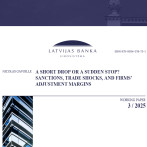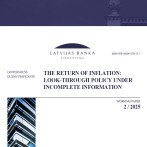Competitiveness, productivity and quality of labour force – key words for sustainable growth in Latvia
For Latvijas Banka Monthly Newsletter, In Focus, July
Boosting productivity and labour productivity: these key words were repeatedly pronounced at the discussion "Has Latvia's economy reached the ceiling?", held at Latvijas Banka on 11 June and dedicated to ensuring sustainable growth, with experts of economics and representatives of business associations and government taking part in it (see complete video and presentations).
Why did Latvijas Banka raise this issue and hold a discussion? If we proceed as before and do nothing, we will have to put up with Latvia's economic growth rate of 2%–3% of GDP instead of 4%–5% of GDP, reached in the post-crisis period. Consequently, reaching the living standards of the most advanced West European economies will still remain just a dream for many future generations.
Despite the deep crisis, Latvia saw faster economic growth on average over the last decade in comparison with other European countries. Nevertheless, Portugal and other countries show that more accelerated growth exceeding the average pace of development has not been guaranteed to any economy, even if its average income level is relatively low. Complacency may bring about a risk of falling into a middle income trap.
The low level of average income in Latvia results from the labour productivity level; hence, productivity should be improved. It can be achieved by introducing modern production technologies, creating more innovative and unique products with the aim of selling them for a higher price, or by reviewing the range of goods and services we are competing with on the global export markets.
Nevertheless, whichever way we choose, the above changes will not be automatic. A specific and conscious government strategy and policy is necessary, aimed at ensuring and supporting these changes. Government support is required, and it should be targeted at companies with potential. At this stage the government support policy is aimed at supporting all companies; as a result, the current situation is maintained instead of making an effort to improve it. Moreover, in order to make positive changes in the economic structure sustainable, the quality issue of labour force available in Latvia is of paramount importance, and is closely related to the overall quality of the educational system in this country.
The mainconclusions of the discussion are as follows:
Firstly, an increase in the number of high value added producers and service providers is a prerequisite for a rise in wages and salaries in the economy. However, it is not and will never be an automatic process, but a logical result of the economic policy implemented in this country which is likely to require policy makers to take measures unpopular in the short term but necessary for the economy in the long run.
Secondly, boosting productivity not only in the sectors producing goods but in all sectors of the economy, inter alia public services, is a mandatory precondition for any sustainable growth. Consequently, a government strategy and top level leadership is necessary. Moreover, an organisational structure identifying productivity problems and formulating and steering changes should be created. The Strategic Analysis Commission, planned to be re-established by the newly-elected President, is a potential driving force to be focusing on developing and further supporting significant reforms. Responsibility of the Prime Minister and the relevant ministries should be envisaged in this process.
Thirdly, the poor linkage of education and research with business and the development of this country is clearly a long-identified problem we are well aware of in Latvia. A clear-cut strategy and tactics with measurable targets in education and research are necessary. This issue, one of the components of the reform in education should be set as one of the priorities of the government, inter alia the Ministries of Education and Science and the Economy, with business associations being its active driving force.
Latvijas Banka is ready to maintain the discussion on challenges and obstacles in Latvia's sustainable growth.
Textual error
«… …»






